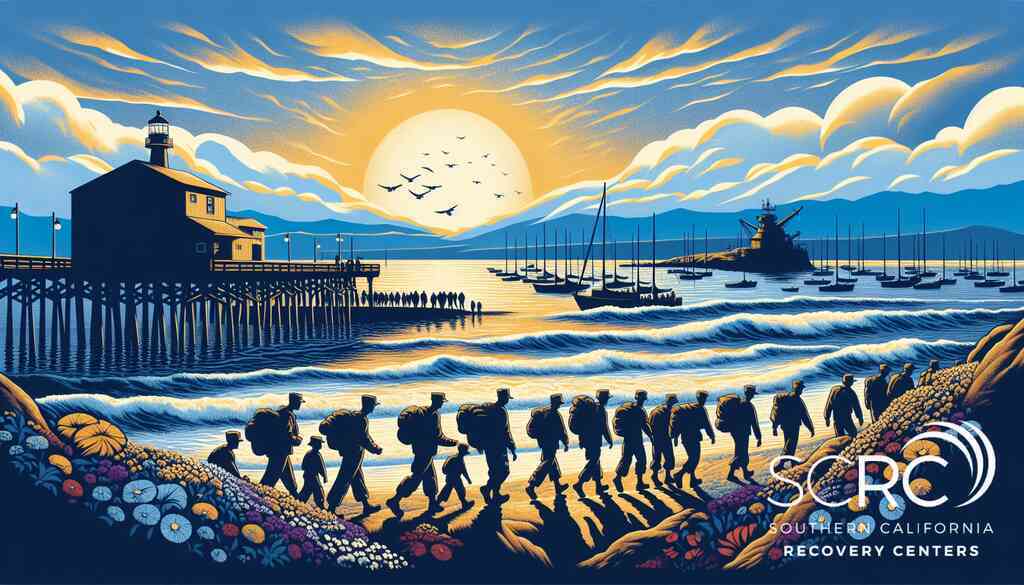Forging the Path to Sobriety
Understanding the Journey of Veterans in South California
Veterans residing in Southern California embark on a distinctive path toward sobriety, one that requires understanding and specialized care. The area offers a wealth of resources, yet veterans face unique hurdles when seeking addiction recovery. This includes not only overcoming substance dependency but also navigating the complexities of reintegrating into civilian life. Facilities like Southern California Recovery Centers are pivotal in providing veteran sobriety programs in South California, offering tailored support to those who have served their country. These programs focus on resilience-building and community integration, essential for veterans embarking on this transformative journey.
Unveiling the Unique Challenges Faced by Veterans
Veterans dealing with addiction face an array of challenges that set their journey apart from the general population. Critical issues such as post-traumatic stress disorder (PTSD), a prevalent result of combat exposure, frequently intersect with substance misuse. Addressing these challenges necessitates a trauma-informed approach, such as recognized trauma-informed care for veterans, which helps unravel the root causes of addiction. Additionally, societal reintegration poses significant stress, often exacerbated by the stigma attached to addiction and mental health in military contexts. Hence, a nuanced understanding of these interwoven challenges is crucial for successful recovery.
The Role of Support and Community in Recovery
Recovery for veterans thrives in environments where support and community are interwoven deeply into the rehabilitation process. A supportive veteran community in recovery offers indispensable camaraderie that fosters healing and growth. These communities serve as vital networks where veterans can share experiences and strategies, thus creating a shared path toward sobriety. Facilities in Southern California emphasize the importance of group therapy, peer support, and a structured environment to bolster this communal spirit. By joining forces with fellow veterans, individuals gain the emotional backing and fellowship that significantly enhance their recovery success, laying a foundation for enduring sobriety and personal empowerment.
Transformative Strategies for Veteran Sobriety
Harnessing Holistic Recovery Approaches
Embracing holistic recovery methods provides veterans with a comprehensive path to sobriety that encompasses mental, physical, and emotional healing. By focusing on aspects beyond mere substance cessation, these approaches delve into the overall well-being of the individual. What Sets Southern California Recovery Centers Apart in 2024? Veterans benefit from practices such as mindfulness meditation, yoga, and nutritional guidance, which foster a healthy lifestyle balance. This multifaceted strategy is essential to address the unique challenges veterans face when transitioning to civilian life. Facilities in Southern California, such as Southern California Recovery Centers, are pivotal in integrating these holistic methodologies, catering specifically to the nuanced needs of veterans by offering diverse and thorough recovery experiences.
Integrating EMDR and Trauma-Informed Care
A key component for veterans recovering from addiction involves the use of EMDR therapy in addiction recovery, which effectively targets trauma-related memories and adverse experiences. Eye Movement Desensitization and Reprocessing (EMDR) has been instrumental in addressing PTSD, a common issue among veterans, by mitigating the psychological impact of trauma. Furthermore, adopting trauma-informed care for veterans ensures that treatment is delivered with an understanding and awareness of trauma’s pervasive effects, fostering a safe and supportive healing environment. How Southern California Recovery Centers Revolutionize Trauma Work? By intertwining these modalities, recovery centers facilitate profound emotional rehabilitation, enabling veterans to confront and surmount the underlying causes of their addiction.
Vocational Training as a Catalyst for Change
Vocational training emerges as a vital catalyst for change in veterans’ sobriety journeys, empowering them with skills necessary for successful civilian reintegration. Programs focusing on vocational training in sobriety equip veterans with the tools to pursue new career paths, fostering a renewed sense of purpose and self-efficacy. Southern California offers various platforms whereby veterans can engage in training that aligns with their interests and capabilities, ultimately enhancing their confidence and job readiness. This approach not only addresses economic stability but also reinforces personal growth and independence as pivotal components of sustained recovery.
Navigating Drug and Alcohol Treatment Programs
Understanding and navigating the nuances of drug and alcohol treatment programs is crucial for veterans striving for sobriety. With specialized programs available in locations throughout South California, veterans have access to tailored plans addressing their specific needs, whether aimed at opioid dependence, cocaine misuse, or alcohol addiction. Centers in Dana Point and Carlsbad offer individualized treatment approaches designed to tackle the root causes of addiction while concurrently supporting the veteran’s holistic recovery journey. These programs are aimed at not only treating the addiction but also empowering the veteran toward personal growth and long-term sobriety, ensuring they have the tools and support needed for their recovery path. Explore Dana Point Recovery Centers.
Structured Sobriety and Personal Empowerment
Building Accountability Through Lifestyle Structures
Implementing lifestyle structures is essential for building accountability in sobriety, especially for veterans. Creating a daily routine encourages discipline, a trait that many veterans find familiar from their military service. Compare Sobriety Strategies for Men in Carlsbad. This structure helps veterans plan their day with intention, reducing idle time, which can lead to relapse. Recovery centers in Southern California emphasize structured sobriety programs for veterans, ensuring a consistent approach to daily activities. By instilling these habits, veterans develop a sense of accountability, fostering a disciplined lifestyle that supports long-term sobriety and personal empowerment.
Life Skills Development: A Critical Component
Life skills development is a critical component of the recovery process, equipping veterans with the tools necessary for success post-treatment. By focusing on practical skills like financial management, job readiness, and communication, recovery centers empower veterans to lead independent lives. This focus on life skills enhances their ability to handle stress and make informed decisions. Life skills development for veterans provides a sense of accomplishment and self-efficacy, further strengthening their recovery journey. Veterans benefit immensely from these programs, which offer a foundation for personal growth and societal reintegration.
Fostering Independence with Continuity of Care
Fostering independence in veterans requires a dedication to continuity of care throughout their recovery journey. By maintaining consistent therapeutic relationships and support networks, veterans experience smoother transitions from structured environments to independent living. Southern California Recovery Centers highlight the importance of continuity of care in recovery, ensuring veterans receive ongoing support and guidance. This approach not only aids in preventing relapse but also bolsters confidence in personal abilities. Programs focusing on continuous support empower veterans to take charge of their lives, ultimately leading them to achieve sustained sobriety and self-reliance.
Continuity of care is crucial for veterans navigating recovery, providing them with the stability needed to thrive beyond treatment settings. Explore more about continuity of care and how it contributes to fostering independence and lifelong empowerment.
Leveraging Southern California Resources
Exploring Dana Point and Carlsbad Recovery Centers
Veterans seeking sobriety in Southern California have the advantage of accessing top-notch recovery centers in Dana Point and Carlsbad. These locations provide tailored treatment plans that specifically cater to the multifaceted needs of veterans. The Carlsbad recovery centers emphasize holistic and structured sobriety programs, ensuring a comprehensive approach to recovery. What Defines Sobriety Success in Carlsbad? A focus on incorporating therapies like EMDR and trauma-informed care allows veterans to address underlying psychological issues. Moreover, the serene environments in Dana Point and Carlsbad are conducive to recovery, offering veterans the tranquility needed for deep healing. The specialized addiction treatment options available in these centers play a crucial role in facilitating enduring sobriety for veterans.
Maximizing Insurance-Covered Treatment Options
Navigating the financial aspects of addiction recovery can often be daunting for veterans. However, the strategic use of insurance to cover treatment costs significantly eases this burden. Southern California Recovery Centers are adept at maximizing insurance-covered addiction treatment options. Ultimate Guide to Prescription Pill Withdrawal: Their experienced admissions staff liaise with insurance providers to ensure veterans receive extensive coverage, thus reducing personal financial strain. This approach not only provides peace of mind but also allows veterans to focus wholeheartedly on their recovery journey. By advocating for optimal insurance utilization, these recovery centers ensure that veterans can access the necessary resources and support without financial hindrance. What Are the Costs of Cocaine Treatment Near Dana Point?
Seamless Admissions for a Stress-Free Start
Beginning the journey to sobriety should be as stress-free as possible for veterans. Recognizing the importance of a smooth transition into treatment, Southern California Recovery Centers prioritize a seamless admissions process. The centers ensure that all logistical aspects are managed efficiently, from insurance verification to treatment plan development. This attention to detail alleviates the administrative burden often associated with entering a recovery program. Moreover, the personalized approach of the admissions team fosters a welcoming and supportive environment right from the start. By removing potential barriers and simplifying the entry process, these centers enable veterans to embark confidently on their path to recovery.
Empowered Sobriety for Life
Embracing a Supportive Veteran Community
A supportive veteran community in recovery serves as a cornerstone for veterans seeking lasting sobriety. Veteran Recovery Centers Near South California These communities offer not only a network of peers who understand the unique experiences and challenges of military life but also provide a platform for sharing sobriety strategies and support. Facilities in Southern California, like the Southern California Recovery Centers, emphasize building such communities to help veterans feel connected and understood. By participating in these groups, veterans find encouragement and solidarity, vital components for sustaining their recovery journey. Look into Veterans Day Resilience: Recovery Success Stories. This collective environment empowers veterans to stay focused and motivated as they transition into a sober lifestyle.
Sustaining Long-Term Recovery and Personal Growth
Achieving long-term sobriety involves a continuous commitment to personal growth and self-improvement. Veterans benefit significantly from structured sobriety programs for veterans that foster ongoing development and resilience. Programs offering vocational training, life skills education, and emotional support are crucial in reinforcing the tools needed for enduring recovery. This holistic approach ensures that veterans do not just maintain sobriety but also thrive in their personal and professional lives. The focus on growth and improvement enables veterans to adapt and overcome new challenges, ensuring that they are equipped to navigate the complexities of civilian life with confidence.
Veterans as Role Models in the Journey to Sobriety
Veterans possess unique qualities that make them exemplary role models in the recovery community. Their experiences with discipline, courage, and perseverance serve as powerful examples for others embarking on similar recovery paths. By sharing their stories and successes, veterans inspire and guide peers who are navigating the challenges of addiction recovery. Engagement in mentoring and leadership roles within recovery programs instills a sense of purpose and fulfillment, further reinforcing their commitment to sobriety. Such contributions not only aid their journey but also strengthen the entire recovery community, underscoring the positive impact of veterans in addiction treatment initiatives.
Frequently Asked Questions
Question: What are some unique challenges that veterans face in addiction recovery, and how do Southern California Recovery Centers address these challenges?
Answer: Veterans encounter distinctive challenges in addiction recovery, such as coping with post-traumatic stress disorder and navigating societal reintegration. Check out Veterans’ Guide to Sobriety in South California. Southern California Recovery Centers specializes in veteran-focused recovery programs by offering trauma-informed care and EMDR therapy. These services are tailored to address trauma-related memories and provide an understanding environment that fosters healing. Our supportive veteran community ensures that veterans receive camaraderie and empathy, easing their reintegration into civilian life and paving a path toward lasting sobriety.
Question: How do holistic recovery approaches benefit veterans seeking sobriety in South California?
Answer: Holistic recovery approaches are integral to veteran sobriety, focusing on comprehensive healing that encompasses mental, physical, and emotional health. At Southern California Recovery Centers, we incorporate practices like mindfulness meditation, yoga, and nutritional guidance to help veterans achieve a balance that goes beyond mere substance cessation. Dive into Mindful Recovery: EMDR’s Role in Healing. Such approaches are vital in addressing the complex needs of veterans, as they promote overall well-being and facilitate smoother transitions into civilian life.
Question: Could you explain the importance of vocational training in sobriety, particularly for veterans?
Answer: Vocational training is a crucial element in veteran sobriety journeys as it equips veterans with essential skills for successful civilian reintegration. Southern California Recovery Centers offers vocational training programs that align with veterans’ interests and capabilities, fostering a renewed sense of purpose and self-efficacy. This focus on skill-building not only enhances job readiness but also reinforces economic stability, personal growth, and independence, which are pivotal for sustained recovery. See more on Guide to Lasting Sobriety Through SCRC’s Unique Approach.
Question: What role does community play in the recovery process at Southern California Recovery Centers, as highlighted in the blog post ‘Top Strategies for Veterans Seeking Sobriety in South California’?
Answer: Community is a cornerstone of the recovery process at Southern California Recovery Centers. We emphasize building a supportive veteran community where participants can share experiences, strategies, and encouragement. This connection fosters an environment of understanding and solidarity, which is essential for veterans overcoming addiction. By participating in group therapies and peer support sessions, veterans gain emotional backing and camaraderie that significantly enhance their recovery success.
Question: How do Southern California Recovery Centers ensure continuity of care for veterans in their addiction recovery journey?
Answer: Continuity of care is pivotal in ensuring veterans thrive beyond treatment settings. Southern California Recovery Centers maintains consistent therapeutic relationships and support networks, aiding veterans in transitioning smoothly into independent living. This approach involves comprehensive outpatient treatment and structured daily living, which help prevent relapse and bolster personal confidence. Refer to Choosing the Right Outpatient Treatment in Carlsbad. We prioritize seamless admissions and maintain steady support to empower veterans, fostering long-term sobriety and self-reliance.





